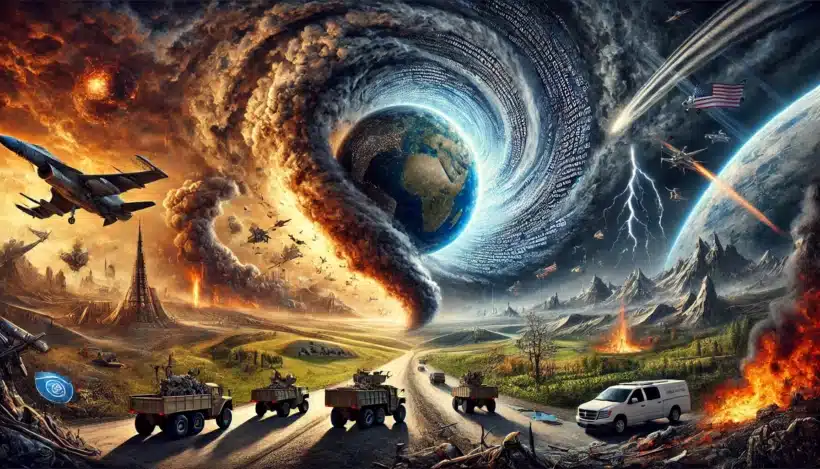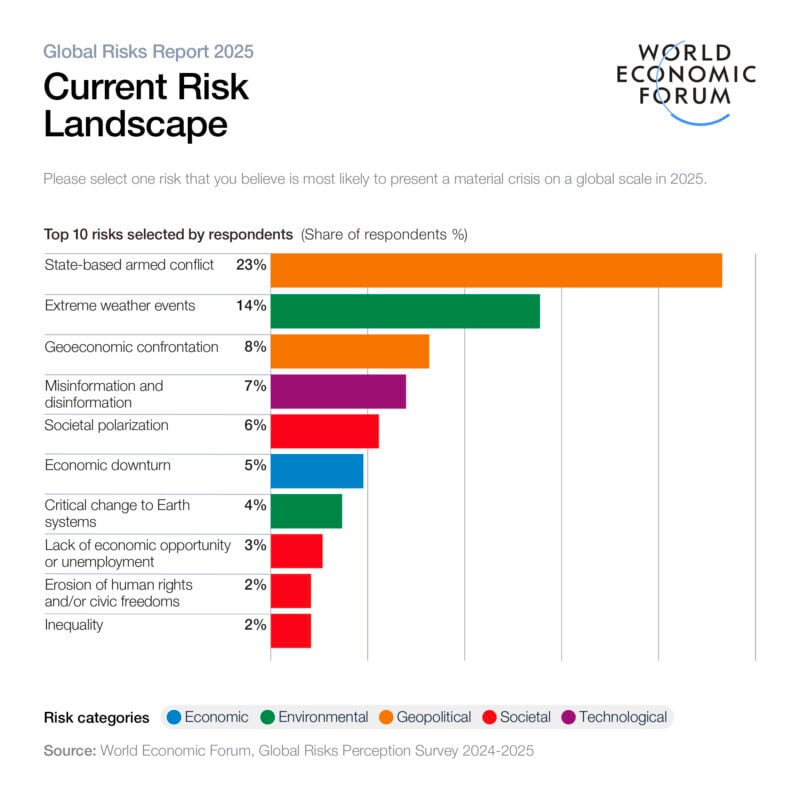
The release of the 20th edition of the World Economic Forum’s Global Risks Report paints a sobering picture of the challenges shaping our collective future. With an increasingly fractured global landscape, the report highlights how escalating geopolitical, environmental, societal, and technological threats are testing the resilience of international systems.
The Top Risks of 2025: A World in Crisis
The report identifies state-based armed conflict as the most pressing immediate global risk for 2025, with nearly 25% of respondents ranking it as their top concern. These conflicts, fueled by growing geopolitical tensions, signal a world grappling with heightened instability.

Misinformation and disinformation, which retain their position as the top short-term societal risks for the second consecutive year, continue to undermine societal trust and governance. As these risks erode cohesion within and between nations, they compound the challenges posed by other immediate threats, such as extreme weather events, societal polarization, and cyber-espionage.
Environmental Challenges: A Long-Term Crisis
Looking beyond immediate concerns, environmental risks dominate the 10-year horizon. From extreme weather events to biodiversity loss, ecosystem collapse, and critical changes to Earth systems, the environmental outlook reflects the urgent need for systemic interventions. Pollution, ranked sixth as a short-term risk, highlights the pervasive impact of air, water, and land pollutants on health and ecosystems.
“Extreme weather events feature prominently across immediate, short-term, and long-term horizons, underscoring their central role in the global risk landscape,” notes the report. With climate change accelerating the frequency and intensity of natural disasters, this remains a critical area for global action.
Technology’s Dual Edge
While technological advancements offer significant opportunities, the report underscores the potential dangers. Misinformation, disinformation, and the adverse outcomes of AI technologies are identified as major long-term risks. As these tools become more pervasive, their misuse could exacerbate societal divisions and erode trust in institutions.
A Stark Outlook: Declining Optimism and Rising Turbulence
Over 900 experts surveyed for the report express growing pessimism about the world’s trajectory. Nearly two-thirds of respondents foresee a turbulent or stormy landscape by 2035, shaped by intensifying environmental, societal, and technological challenges.
Short-term projections aren’t much brighter. Over half of respondents anticipate instability within the next two years, driven by a breakdown in international cooperation and rising societal fractures, such as inequality and polarization. Vulnerabilities such as illicit economic activity, mounting debt burdens, and the concentration of strategic resources further compound the global risk outlook.
The Call for Collective Action
“Rising geopolitical tensions and a fracturing of trust are driving the global risk landscape,” said Mirek Dušek, Managing Director, World Economic Forum. “In this complex and dynamic context, leaders have a choice: to find ways to foster collaboration and resilience, or face compounding vulnerabilities.”
The report calls for urgent, collective action to address these challenges. Key recommendations include:
- Reinforcing Multilateral Institutions: Strengthening global frameworks to manage shared challenges effectively.
- Promoting Dialogue: Encouraging open communication among nations to rebuild trust and reduce polarization.
- Prioritizing Sustainability: Accelerating efforts to mitigate environmental risks and adapt to climate change.
- Harnessing Technology Responsibly: Developing frameworks to manage the risks associated with AI and other emerging technologies.
A Decisive Decade
As divisions deepen and global systems face unprecedented strain, the coming decade is pivotal. “From conflicts to climate change, we are facing interconnected crises that demand coordinated, collective action,” emphasizes Mark Elsner, Head of the Global Risks Initiative at the World Economic Forum. “Renewed efforts to rebuild trust and foster cooperation are urgently needed. The consequences of inaction could be felt for generations to come.”
In a world where 64% of experts anticipate a fragmented global order marked by competition among powers, the report urges leaders to resist the temptation to turn inward. Instead, nations must prioritize dialogue, strengthen international ties, and foster collaboration to navigate these complex risks. By doing so, humanity can chart a path toward a resilient, sustainable, and inclusive future.

